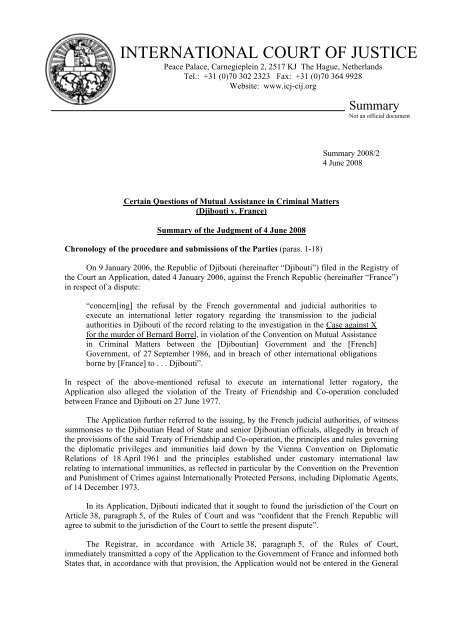Typical Obstacles Faced When Implementing Letters Rogatory Requests
Typical Obstacles Faced When Implementing Letters Rogatory Requests
Blog Article
Letters Rogatory Explained: Facilitating Legal Participation In Between Countries

Interpretation of Letters Rogatory
Letters rogatory are formal requests made by a court in one territory to a court in one more jurisdiction, looking for assistance in obtaining proof or testimony for a legal action. This procedural mechanism is vital in the context of worldwide legislation, where legal systems may vary, and cross-border cooperation is essential. Letters rogatory assist in the gathering of info that might be crucial for adjudicating situations, especially in instances entailing intricate transnational issues.
Typically, these requests emerge in civil, criminal, or administrative matters where a celebration calls for proof that is situated outside the jurisdiction of the asking for court. The letters work as a method to ensure that the principles of due process are promoted, enabling courts to gain access to evidence that may or else continue to be inaccessible because of geographical or lawful barriers.
Using letters rogatory is regulated by worldwide treaties, bilateral contracts, or residential legislations, which define the treatments and obligations of the courts included. It is crucial to keep in mind that the implementation of such demands is not guaranteed; they depend upon the legislations and methods of the territory receiving the letter. Hence, letters rogatory are a crucial tool for promoting lawful collaboration and making sure justice across borders.
The Process of Issuing Letters Rogatory
Issuing letters rogatory entails a structured process that guarantees compliance with both worldwide and residential legal standards. The requesting event, normally a court or legal authority, drafts a formal request detailing the nature of the aid looked for, the evidence or details required, and the legal basis for the request. This paper should be exact to help with understanding by the international jurisdiction.

The following action entails transferring the letters rogatory to the designated international authority. This is often done through polite channels or worldwide lawful aid structures, ensuring that the request is received and recognized by the international court. The international court then processes the demand according to its very own lawful procedures, inevitably responding to the requesting party with the desired details or evidence, thus facilitating global lawful collaboration.
Significance in International Regulation
The value of letters rogatory in global legislation can not be overstated, as they function as an essential system for judicial cooperation throughout borders. These formal demands for assistance in lawful matters allow courts in one territory to inquire, evidence, or the presence of witnesses from an additional jurisdiction, therefore helping with the administration of justice in global situations.
Letters rogatory are particularly crucial in the context of globalization, where legal disputes usually cover multiple countries. They enable the collection of proof that might or else be inaccessible, making certain that legal proceedings are notified and reasonable. By promoting collaboration between judicial systems, letters rogatory assistance support the regulation of legislation and advertise mutual regard among countries.
Moreover, making use of letters rogatory shows a dedication to global norms and concepts of participation, showing the interconnected nature of modern lawful practices. It shows the relevance of adhering to recognized procedures and treaties, such as the Hague Convention, which supplies a structure for these requests - Letters rogatory. Ultimately, letters rogatory improve the efficiency of legal processes, guaranteeing that justice is not prevented by geographical boundaries
Obstacles and Limitations
Regardless of their importance, letters rogatory face a number of difficulties and constraints that can hamper their performance. One key issue is the varying legal structures and procedures across jurisdictions, which can result in misunderstandings and delays in the execution of requests. Different countries may have unique needs for the legitimacy of letters rogatory, making complex the procedure better.
Furthermore, the usually lengthy nature of international legal participation can prevent prompt accessibility to proof or witnesses. This delay might adversely impact ongoing investigations or legal proceedings, particularly in situations requiring immediate activity. In addition, the absence of sources and training in some jurisdictions can lead directory to inadequate handling of requests, resulting in poor or insufficient actions.
Nations with much less formal legal systems might struggle to conform with the procedural rigor expected in letters rogatory. These obstacles necessitate continuous discussion and reform to improve the efficiency of letters rogatory in legal collaboration.
Study and Instances

Alternatively, challenges can develop, as seen in a case including a European country seeking proof in a recurring criminal matter from a non-EU nation - Letters rogatory. The procedure was delayed because of governmental hurdles and differing legal criteria, ultimately impeding the examination
These examples illustrate that while letters rogatory can facilitate worldwide participation and expedite legal procedures, they additionally highlight the demand for clear communication and understanding of legal structures in between nations. Such case researches underscore the value of refining this device to boost performance and effectiveness in international lawful issues.
Verdict
In summary, letters rogatory act as a vital system for assisting in lawful participation in between nations, making sure the collection of evidence and testimony across territories. Their significance in global regulation can not be overemphasized, as they promote due procedure and boost the performance of cross-border lawful process. Difficulties such as differing political stress and lawful structures may prevent their performance. Proceeded efforts to enhance the procedure and improve are vital for promoting stronger global judicial cooperation.
Letters rogatory are formal requests made by a court in one territory to a court in one more jurisdiction, looking for support in getting proof or testament for a lawful proceeding. The asking for celebration, generally a court or lawful authority, drafts an official request describing the nature of the help sought, the proof or information required, and the legal basis for the demand. The international court then refines the request according to its very own legal procedures, inevitably responding to the asking for party with the desired information or proof, click this link thus facilitating worldwide lawful collaboration.
In addition, the use of letters rogatory shows a commitment to worldwide standards and principles of teamwork, mirroring the interconnected nature of modern lawful practices.Worldwide lawful cooperation with letters rogatory is not without its real-world implications, as shown by numerous case research studies that highlight both challenges and successes.
Report this page